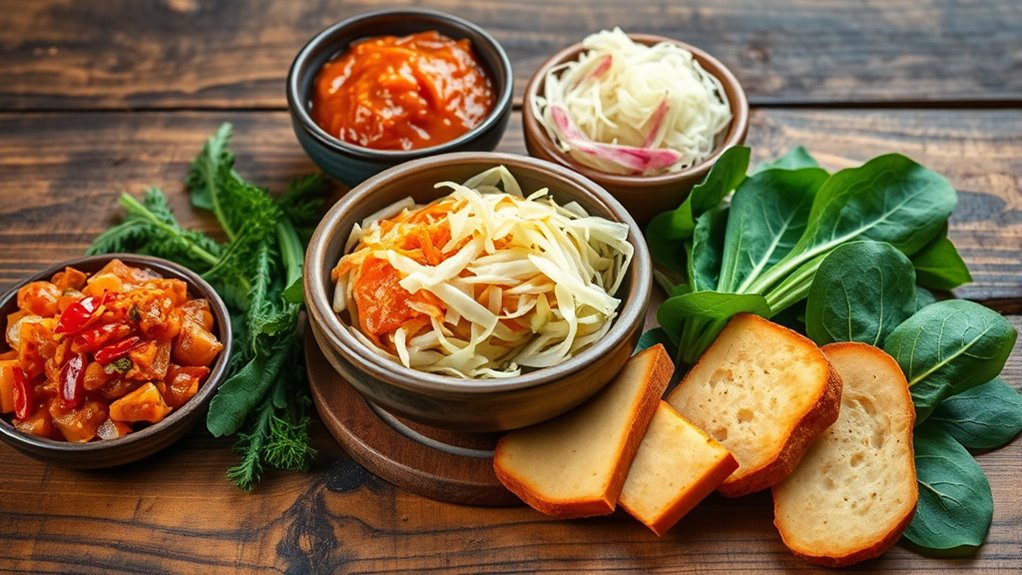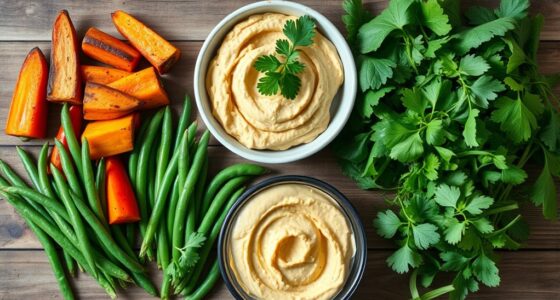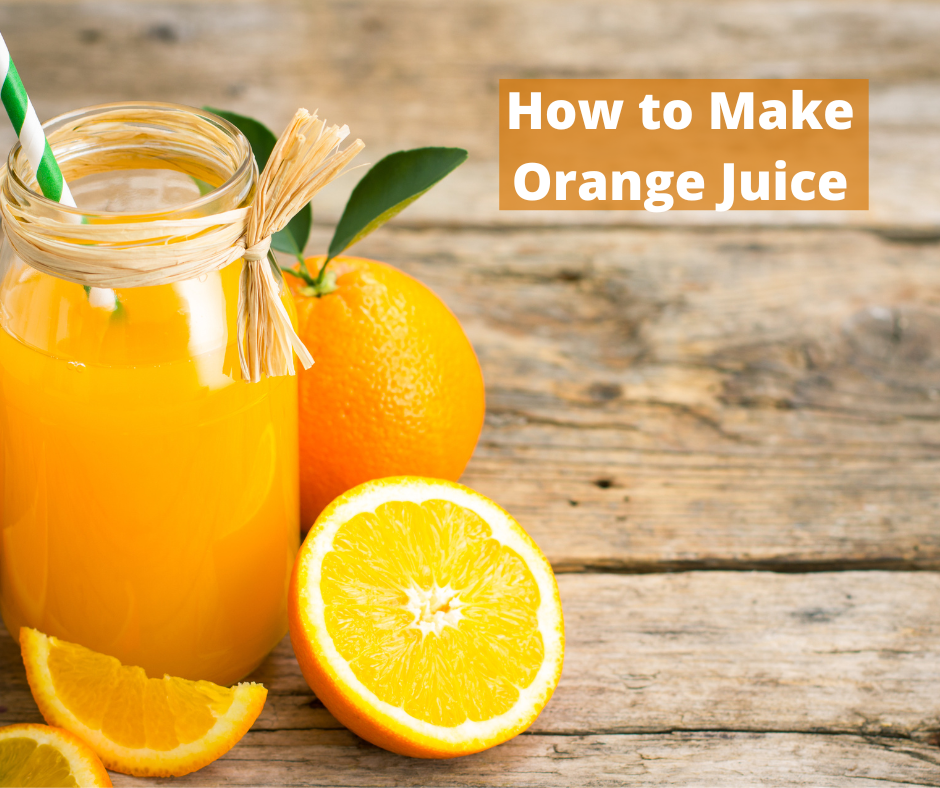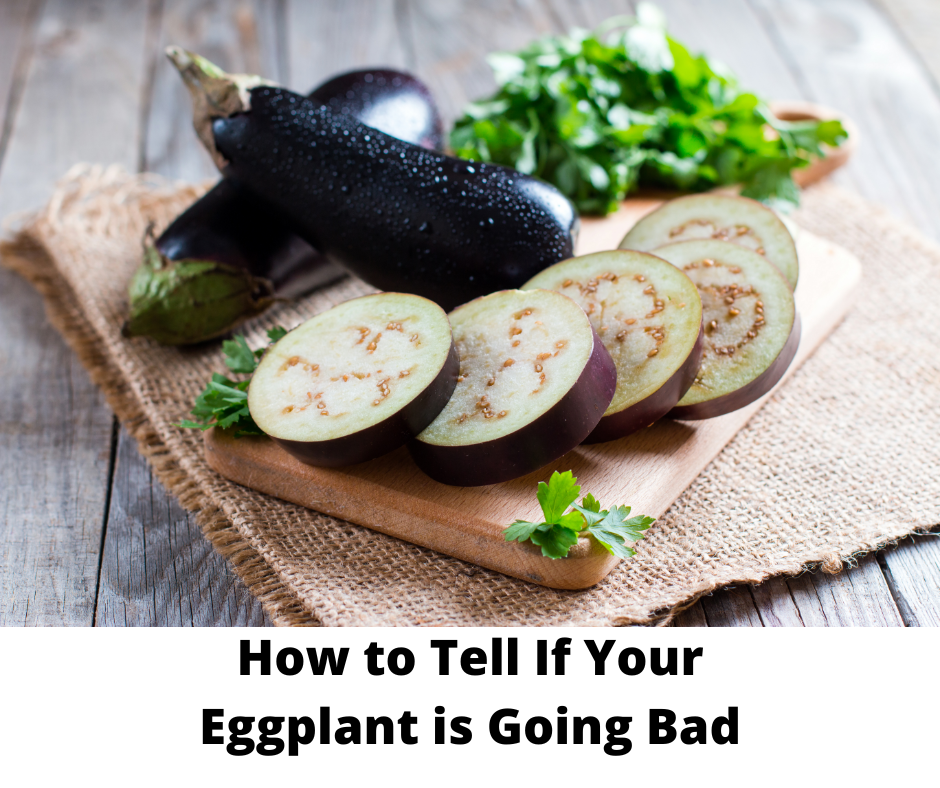Fermented foods play a essential role in vegan nutrition by boosting your gut health and enhancing nutrient absorption. They provide beneficial probiotics that support your immune system and help maintain a balanced microbiome. Fermentation also makes vitamins, minerals, and antioxidants more accessible, which is fundamental when following a plant-based diet. If you want to discover how to incorporate these nourishing foods safely and effectively, there’s more to explore below.
Key Takeaways
- Fermented foods provide beneficial probiotics that support gut health and enhance nutrient absorption in a vegan diet.
- They increase the bioavailability of vitamins, minerals, and antioxidants, improving overall nutritional intake.
- Fermentation reduces antinutrients in plant-based foods, aiding digestion and nutrient utilization.
- They help maintain a healthy gut microbiome, strengthening the immune system and disease resistance.
- Fermented vegan products can supply essential nutrients like vitamin B12, complementing plant-based diets.
Understanding Fermented Foods and Their Production
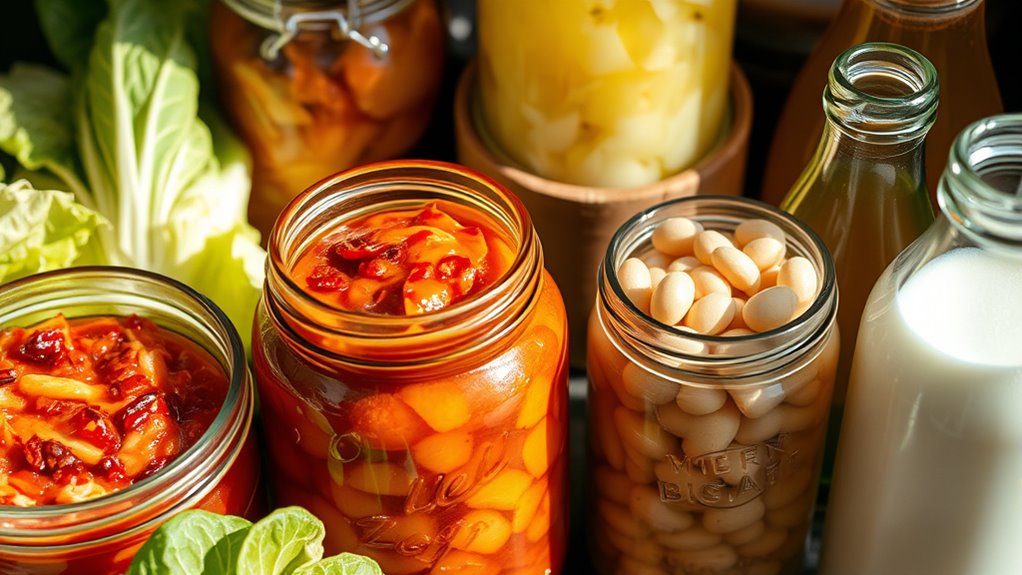
Have you ever wondered how fermented foods develop their unique flavors and health benefits? It all starts with the fermentation vessel, which provides the environment for beneficial microbes to thrive. The process relies on microbial diversity, meaning a variety of bacteria, yeasts, and molds work together to transform raw ingredients. You’ll find that different vessels, like jars, crocks, or specialized fermenters, influence the fermentation’s outcome by controlling factors like temperature and oxygen. As microbes break down sugars and other compounds, they produce acids, gases, and other compounds that give fermented foods their distinctive taste and texture. Understanding this process helps you appreciate how each step in fermentation shapes the final product, enriching both flavor and nutritional value. Additionally, the types of fermentation vessels used can impact the microbial community, thereby affecting both flavor development and health benefits. The choice of vessel can also influence the fermentation speed and consistency of results, which are important factors for both home fermenters and commercial producers. Moreover, the cost and material of vessels can affect the overall fermentation process and outcomes, especially in large-scale production.
Key Nutrients in Fermented Plant-Based Foods
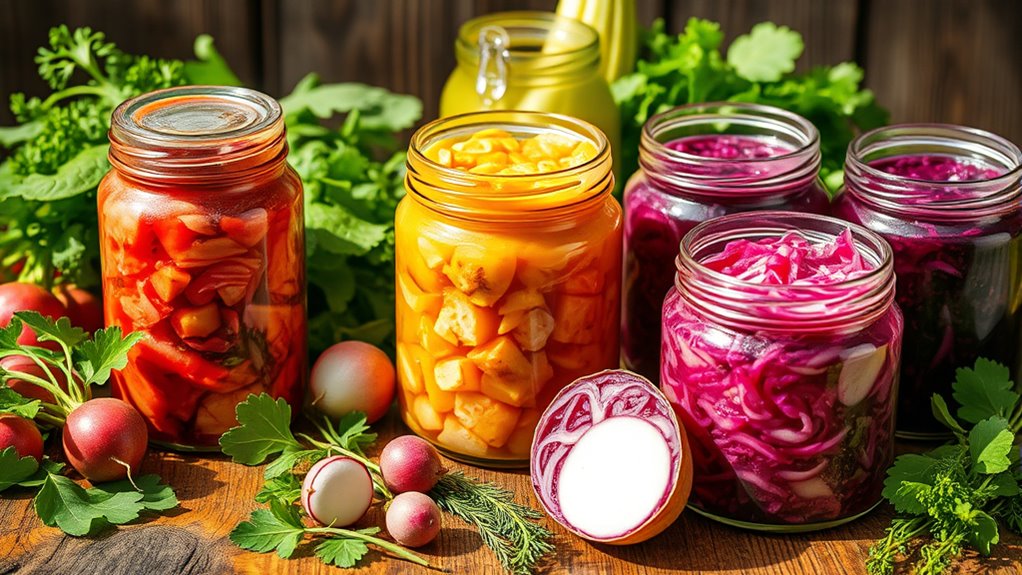
Fermented plant-based foods are rich in probiotics, which play a vital role in supporting your gut health. These beneficial microbes also help your body absorb nutrients more effectively. Understanding their impact can help you make smarter choices to boost your overall nutrition. Additionally, incorporating high-quality fermentation techniques can enhance the probiotic content and overall benefits of these foods. Employing proper fermentation practices can further improve the safety and potency of your fermented foods, ensuring maximum health benefits. Practicing mindfulness during fermentation can also help you better monitor and control the process for optimal results, especially when considering textile art display techniques that require careful handling and presentation. Incorporating noise levels considerations during fermentation, such as maintaining a quiet environment, can also influence the success of your fermentation process.
Probiotic Content Significance
Probiotic content plays a crucial role in the nutritional value of fermented plant-based foods, especially for those following a vegan diet. It boosts gut health and supports immune function. Think of it as a live, beneficial army working inside you. When exploring kefir varieties, you’ll notice how different fermentation techniques influence probiotic diversity. For example:
- Traditional dairy kefir offers a wide range of strains.
- Water kefir uses sugar water, cultivating different probiotics.
- Coconut kefir combines plant sugars with fermentation.
- Fermentation methods impact probiotic potency and variety.
Your choices matter—using various fermentation techniques can enhance probiotic content, making fermented foods more effective. These probiotics help maintain a healthy microbiome, indispensable for overall wellness in a vegan diet.
Enhanced Nutrient Absorption
Enhanced nutrient absorption is one of the key benefits of consuming fermented plant-based foods, making your diet more effective at nourishing your body. Fermentation breaks down complex compounds, increasing bioavailability of key nutrients like vitamins, minerals, and antioxidants. Different fermentation techniques influence flavor profiles, enhancing taste and digestibility. For example, lactic acid fermentation creates tangy flavors, boosting your enjoyment and nutrient uptake. This process also reduces antinutrients that hinder nutrient absorption, ensuring your body gets more from each meal. Here’s a quick overview:
| Nutrient Type | How Fermentation Helps |
|---|---|
| Vitamins | Increased synthesis and bioavailability |
| Minerals | Better absorption due to breakdown of inhibitors |
| Antioxidants | Preservation and enhanced activity |
| Proteins | Improved digestibility |
| Flavor Profiles | Richer, more appealing tastes through fermentation techniques |
Probiotics and Gut Health Enhancement
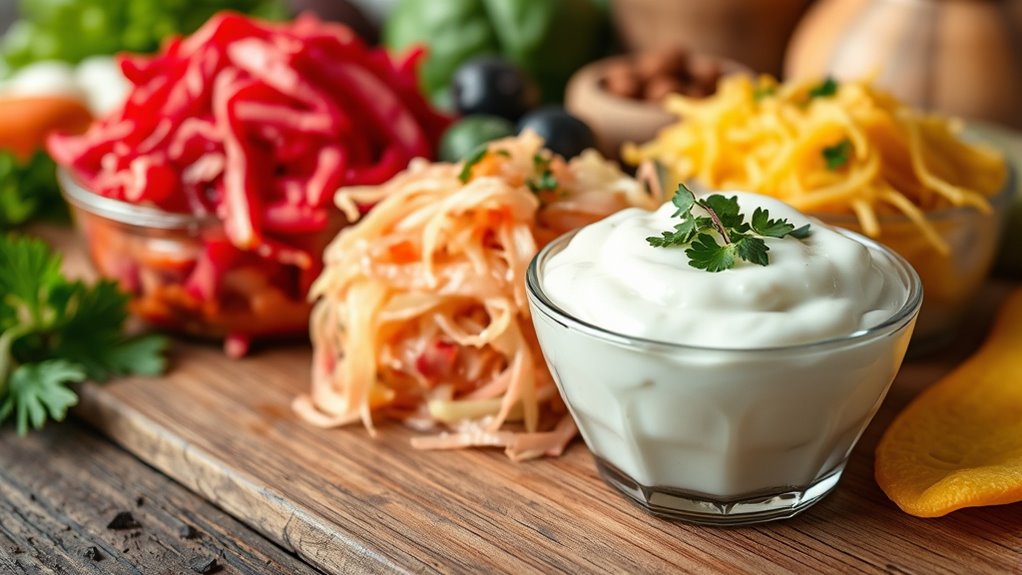
Because maintaining a healthy gut is essential for overall well-being, incorporating probiotics into your vegan diet can play a crucial role. Fermentation techniques transform plant foods into powerful sources of beneficial bacteria. When you consume cultured plant foods, you’re directly supporting your gut microbiome. Imagine:
Supporting your gut health with fermented plant foods is essential for overall well-being.
- Juicy sauerkraut made from crunchy cabbage, rich in probiotics.
- Tangy kimchi fermented with spicy peppers and garlic.
- Creamy plant-based yogurt with live cultures.
- Fermented vegetables that burst with flavor and health benefits.
These foods help balance gut bacteria, improve digestion, and boost nutrient absorption. By exploring different fermentation techniques, you enhance the probiotic content of your diet naturally. Incorporating cultured plant foods into your meals makes gut health a delicious and essential part of your vegan lifestyle. Additionally, understanding the cultural impact of fermentation can inspire you to explore diverse recipes and techniques from around the world. Recognizing how fermentation influences production quantities and cost management further underscores its importance in food processing and sustainability. Moreover, leveraging automation in food production can optimize fermentation processes for higher efficiency and quality. Incorporating beneficial bacteria through fermentation not only supports gut health but also enhances the preservation and flavor of plant-based foods.
Immune System Support Through Fermentation
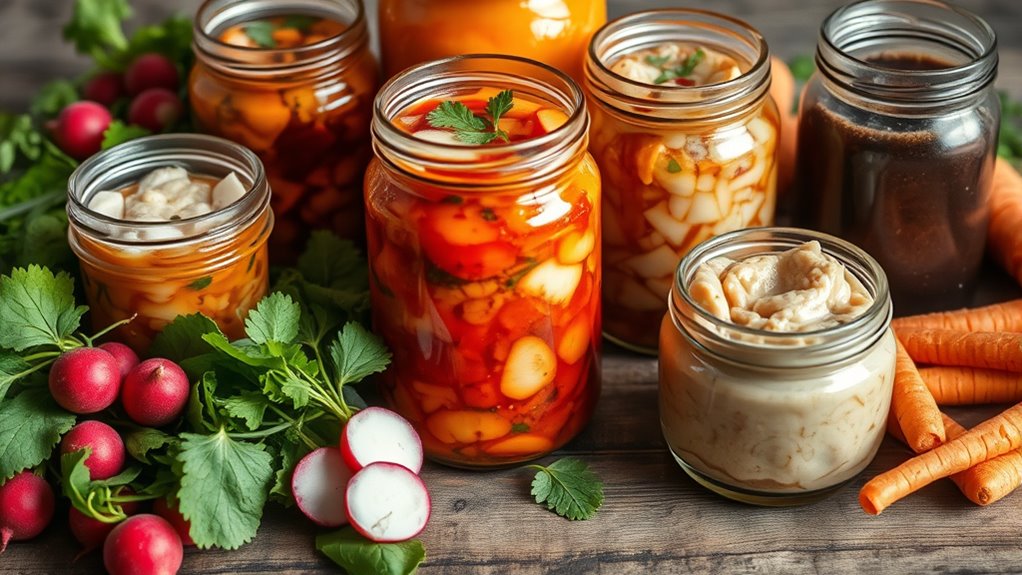
Fermented foods can play a key role in strengthening your immune system by providing beneficial probiotics. These live microbes help improve your gut health, which is closely linked to immunity. As a result, they support your body’s ability to resist infections and fight off diseases more effectively. Incorporating a variety of fermented foods into your diet can further enhance these immune benefits. Additionally, understanding food presentation and proper food presentation can improve your dining experience and encourage healthier eating habits. Recognizing the father-daughter bond and its significance can also inspire a nurturing approach to health and wellness. Moreover, the presence of probiotics in fermented foods contributes to maintaining a healthy balance of gut bacteria, which is essential for a strong immune response.
Probiotics Boost Immunity
Probiotics found in fermented foods play a crucial role in strengthening your immune system. Consuming fermented beverages with plant-based probiotics helps your body defend against illnesses. Imagine:
- Sipping a tangy kombucha, full of live cultures supporting immunity.
- Enjoying a glass of kefir made from plant-based ingredients, boosting your natural defenses.
- Incorporating fermented coconut water that nourishes your gut and enhances resilience.
- Adding fermented plant-based drinks to your routine, creating a barrier against harmful pathogens. Gut health is fundamental to overall immunity and well-being.
These fermented beverages deliver beneficial bacteria directly to your gut, promoting a balanced microbiome. By regularly consuming plant-based probiotics, you empower your immune system to respond more effectively, reducing the risk of infections and supporting overall health. Existential themes in modern discussions highlight the importance of maintaining a healthy microbiome for overall well-being. Additionally, understanding the diverse types of fermented foods can help optimize your dietary choices for better immunity.
Gut Health Enhancement
Building on the immune-boosting benefits of fermented foods, enhancing your gut health is a key step toward overall wellness. The fermentation process not only preserves food but also creates beneficial probiotics that support digestion and nutrient absorption. As these probiotics colonize your gut, they promote a healthy balance of bacteria, which is essential for a strong immune system. Plus, fermentation often enhances flavor, making your vegan meals more enjoyable and appealing. You’ll notice a richer, tangier taste that encourages regular consumption. By incorporating fermented foods into your diet, you actively nourish your gut microbiome, reducing inflammation and improving gut barrier function. This, in turn, strengthens your body’s natural defenses, providing a solid foundation for overall health and resilience.
Disease Resistance Support
Since a strong immune system is essential for defending against illnesses, incorporating fermented foods into your vegan diet can markedly boost your body’s natural defenses. Fermentation techniques enhance nutrient availability and introduce probiotics that support immunity. Fiber diversity in these foods plays a vital role by nourishing beneficial gut bacteria, which directly influences immune responses. Imagine your immune system as a fortress, strengthened by:
- Probiotic-rich foods that activate immune cells
- Fermented vegetables boosting gut microbiota diversity
- Enzymes from fermentation aiding nutrient absorption
- Varied fibers increasing beneficial bacteria resilience
Fermented Foods as Sources of Vitamin B12
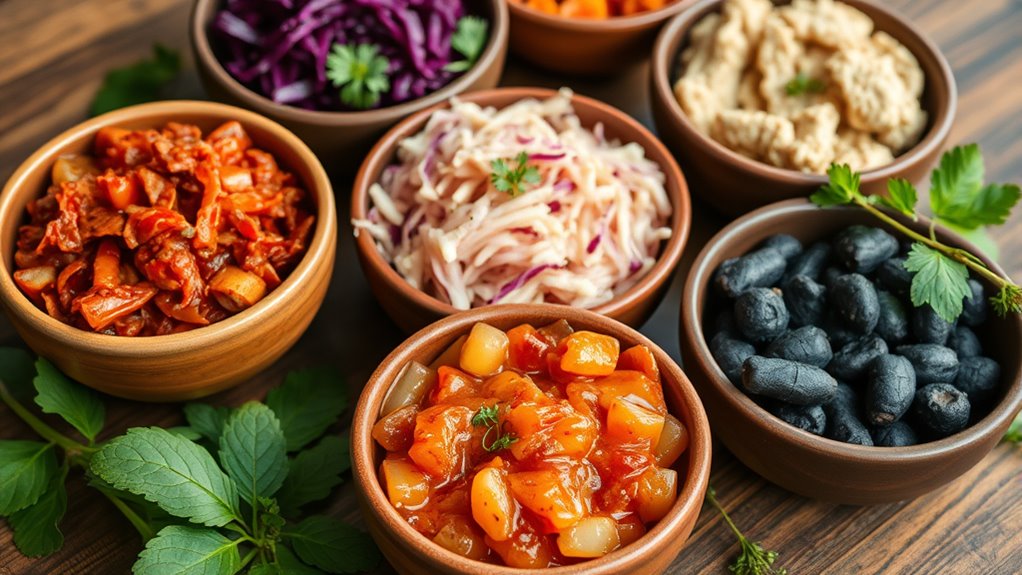
Are fermented foods reliable sources of vitamin B12 for those following a vegan diet? Not always. While some fermented foods, like vegan cheese enriched with vitamin B12, can provide this nutrient, many depend on plant-based probiotics that naturally produce B12 during fermentation. However, the B12 content in these foods varies widely, and not all contain sufficient amounts to meet daily requirements. It’s important to check labels and select products fortified with B12 or containing specific strains known to produce the vitamin. Relying solely on fermented foods may not guarantee adequate intake, so consider supplementation or fortified foods as part of your vegan nutrition plan. This approach helps ensure you meet your B12 needs without compromising your plant-based lifestyle.
Improving Digestion and Nutrient Absorption
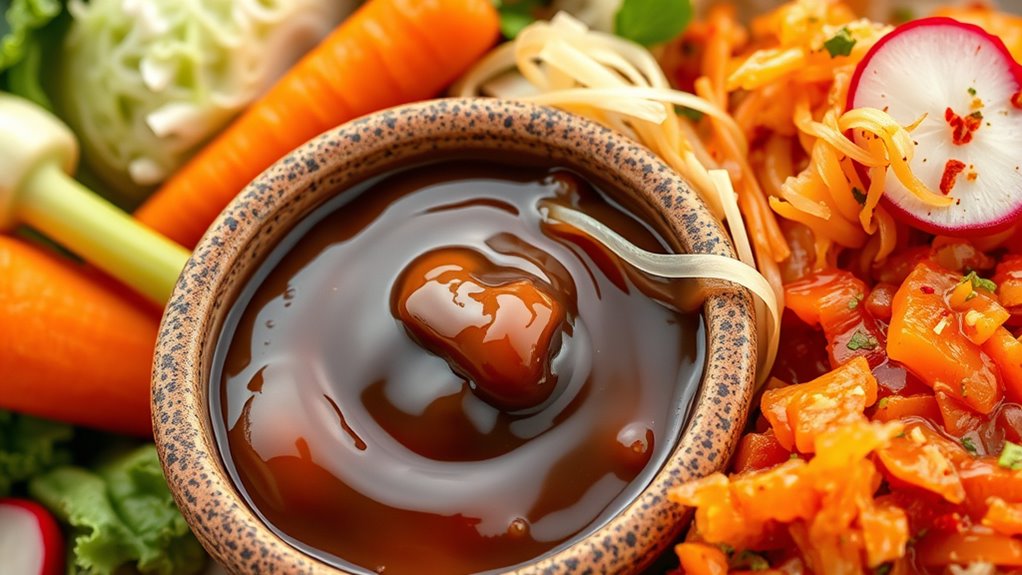
Optimizing digestion and nutrient absorption is essential for maximizing the health benefits of fermented foods in a vegan diet. Fermentation methods enhance the availability of nutrients and introduce plant-based probiotics that support gut health. To improve digestion, consider:
Enhance nutrient absorption and gut health with diverse, regular fermented plant foods in your vegan diet.
- Choosing diverse fermented foods like kimchi, sauerkraut, or tempeh to promote a balanced microbiome.
- Incorporating a variety of fermentation methods to increase probiotic diversity.
- Consuming fermented foods regularly to maintain a steady supply of beneficial bacteria.
- Pairing fermented foods with fiber-rich plant foods to boost nutrient absorption.
These practices help your gut effectively break down food, extract crucial nutrients, and improve overall absorption, ensuring that your vegan diet maximizes its health potential through fermented foods.
Incorporating Fermented Foods Into Vegan Meals
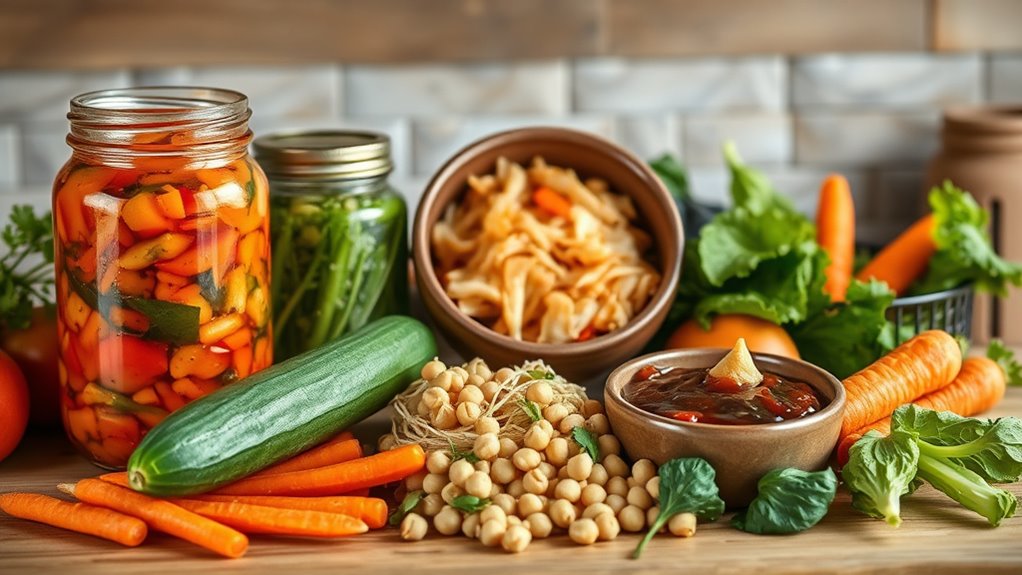
You can get creative by adding fermented foods like kimchi or sauerkraut to salads, sandwiches, or rice bowls. Experimenting with different flavor combinations makes meals more interesting and nourishing. Try pairing tangy ferments with spicy dishes or creamy spreads to enhance taste and health benefits.
Creative Fermentation Ideas
Incorporating fermented foods into vegan meals can be both creative and delicious, adding depth of flavor and probiotic benefits. To enhance flavor development, consider experimenting with different fermentation containers like glass jars or ceramic crocks. Here are some ideas to inspire you:
- Mix tangy kimchi into vegan tacos for a spicy crunch.
- Add homemade sauerkraut to hearty grain bowls for extra zest.
- Incorporate fermented cashew cheese into wraps or dips.
- Use fermented vegetables as toppings on salads or pizzas.
These ideas allow you to explore various textures and flavors, making your meals more vibrant. Focus on proper fermentation containers to optimize flavor development and ensure safe, successful fermentation. Let your creativity run wild while boosting your vegan diet with probiotic-rich foods.
Delicious Meal Pairings
Fermented foods can elevate the flavor profile of your vegan meals when paired thoughtfully. Imagine enjoying a slice of crusty sourdough bread alongside a vibrant kimchi recipe—this combination adds tang and complexity that enhances simple dishes. Use sourdough bread as a base for avocado spreads topped with fermented vegetables, creating a delicious, probiotic-rich snack. Incorporate kimchi into stir-fries, bowls, or salads to introduce a spicy, fermented punch that complements vegetables and grains. Fermented foods also work well in wraps or open-faced sandwiches, adding depth and texture. By experimenting with these pairings, you amplify your meals’ flavors while boosting their nutritional value. With a little creativity, fermented foods become an exciting, integral part of your vegan culinary repertoire.
Potential Challenges and Considerations
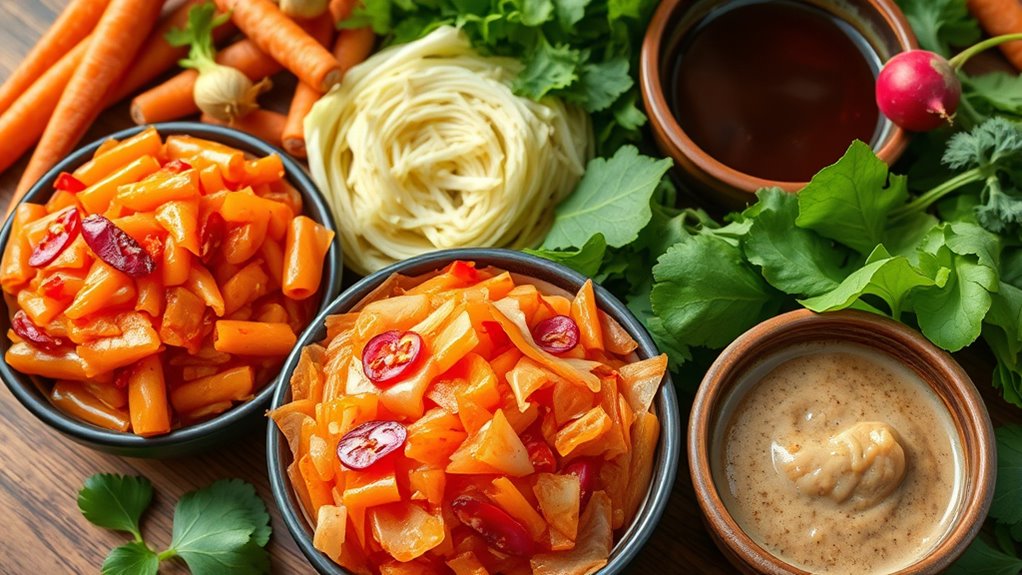
While fermented foods offer numerous benefits for vegan nutrition, they also present certain challenges that need careful consideration. First, allergen considerations can be tricky, as some fermented products may contain soy, gluten, or other allergens that affect sensitive individuals. Second, proper storage is essential; these foods often require refrigerated environments to maintain safety. Third, their shelf life can be limited, increasing the risk of spoilage if not consumed promptly. Fourth, fermentation processes can vary, leading to inconsistent flavors or textures. Always check labels for allergen information, store foods in airtight containers, and follow recommended expiration dates. Being mindful of these factors guarantees you enjoy the benefits of fermented foods without unintended health issues.
Homemade Fermentation: Tips and Recipes
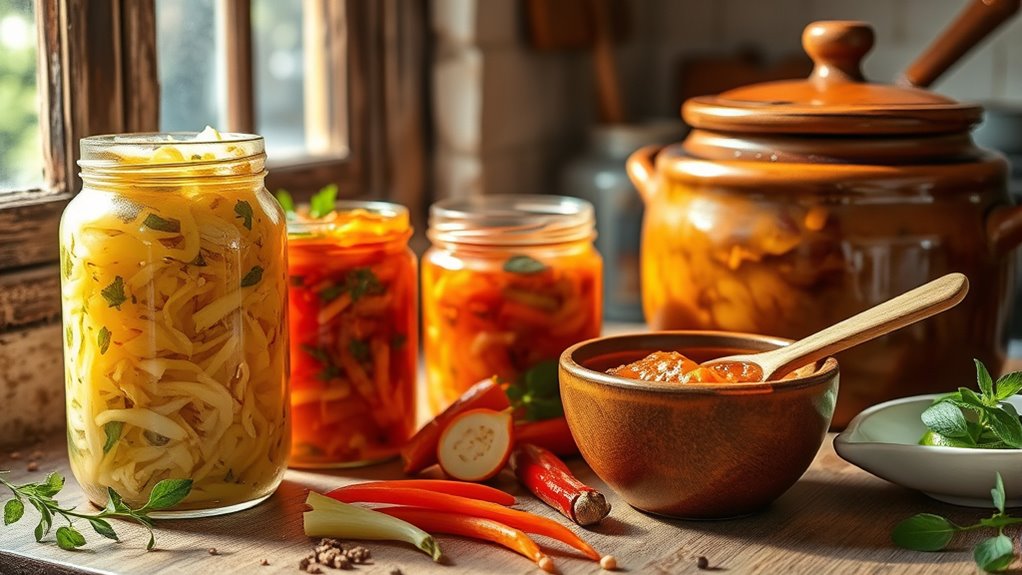
Making fermented foods at home can be a rewarding way to enjoy their health benefits while customizing flavors to your liking. To guarantee fermentation safety, always sterilize your equipment thoroughly before starting. Clean jars, fermentation tools, and utensils with hot, soapy water, then rinse well. Using sterilized equipment prevents harmful bacteria from contaminating your ferment. Keep your workspace clean and handle ingredients with clean hands. Follow trusted recipes for specific fermentation times and conditions to avoid spoilage. Monitor your ferments regularly for any signs of mold or bad odors, discarding questionable batches. Proper equipment sterilization and attention to hygiene are key to successful homemade fermentation, helping you create safe, delicious vegan probiotic foods that boost your gut health.
Future Trends in Fermented Vegan Nutrition
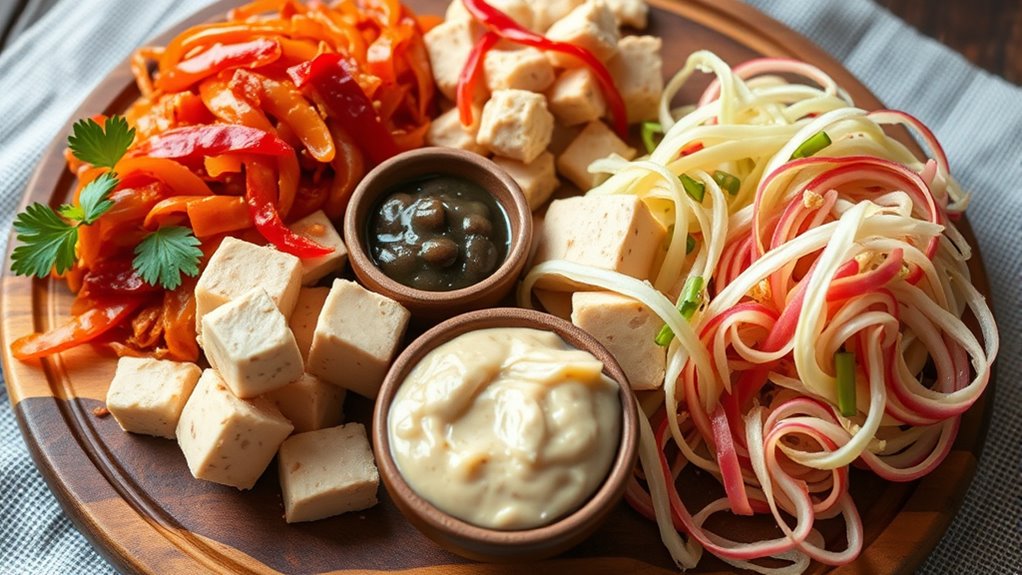
As awareness of plant-based diets grows, the future of fermented vegan nutrition is poised for innovation. Expect advancements in fermentation techniques that maximize probiotic benefits while preserving plant-based nutrients. You might see new products featuring plant-based probiotics, designed to enhance gut health and overall wellness. Innovations could include:
- Fermentation methods that increase probiotic diversity and potency.
- Customized fermented foods tailored to individual health needs.
- Incorporation of exotic plant ingredients into traditional fermentation processes.
- Enhanced shelf stability and flavor profiles for wider appeal.
These developments will make fermented foods more accessible, functional, and appealing for vegans, helping you optimize your nutrition through science-backed plant-based probiotics and cutting-edge fermentation techniques.
Frequently Asked Questions
How Do Fermented Foods Compare Nutritionally to Non-Fermented Vegan Options?
Fermented foods often provide greater nutritional advantages than non-fermented vegan options because their fermentation processes enhance nutrient bioavailability. You get more vitamins, probiotics, and easier digestion from fermented choices, boosting your gut health and overall nutrition. Non-fermented foods may lack these benefits, but both can be nutritious. By incorporating fermented foods into your diet, you maximize nutrient absorption and support your wellness goals naturally and effectively.
Are There Any Risks Associated With Consuming Fermented Vegan Foods Regularly?
Thinking of fermented vegan foods as a double-edged sword, they can offer health benefits but also come with risks. You might face potential allergen concerns or the risk of microbial contamination if not prepared properly. Regular consumption isn’t inherently dangerous, but it’s smart to guarantee proper storage and hygiene. Always listen to your body and consult a healthcare professional if you notice adverse reactions, so you can enjoy these foods safely.
Which Fermented Foods Are Most Suitable for Individuals With Food Sensitivities?
If you have food sensitivities, you’ll want fermented foods that are gentle on your system. Look for dairy alternatives like coconut yogurt or almond-based kefir, which are usually well-tolerated. Gluten-free options such as fermented vegetables or gluten-free kimchi can also be suitable. Always check labels and choose products with minimal additives to avoid reactions, and consider consulting a healthcare professional for personalized guidance.
How Long Do Fermented Foods Retain Their Nutritional Benefits?
Fermented foods typically retain their nutritional benefits for about one to three weeks, depending on storage conditions. To maximize shelf life, keep them refrigerated in airtight containers and avoid cross-contamination. Proper storage tips include maintaining a consistent cold temperature and checking for signs of spoilage, like mold or off-odors. By following these guidelines, you guarantee you get the most health benefits from your fermented foods over time.
Can Fermented Foods Replace Traditional Probiotic Supplements in Vegan Diets?
You might wonder if fermented foods can replace traditional probiotic supplements in your vegan diet. While the fermentation process boosts probiotic diversity in foods, supplements often provide targeted strains in precise amounts. Fermented foods offer natural, whole-food benefits, but they may lack consistency. So, consider combining both to guarantee you get a broad spectrum of probiotics for ideal gut health, rather than relying solely on fermented foods.
Conclusion
By adding fermented foods to your vegan diet, you boost your gut health, immune system, and nutrient intake. Did you know that some fermented foods can contain up to 20 times more probiotics than their fresh counterparts? Embracing these foods not only enriches your meals but also supports overall wellness. So, explore new recipes and incorporate fermented options—you might just find your health benefits multiply faster than you expect!
